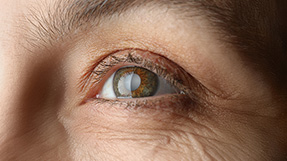Cataracts and Cataract Surgery: A Simple Explanation from Your Eye Doctor

Every year approximately 3 million Americans undergo cataract surgery. The most common surgery done in the United States can dramatically improve vision that has become cloudy. But did you know that your happiness with the outcome of cataract surgery is partially the result of some important decisions you will make prior to surgery? To better understand these decisions, it may help to know what a cataract is, how it affects vision, and how surgery addresses the problem.
The human eye is designed to provide sight with the ability to focus at different distances. There are 3 factors that affect the power of the eye and determine its focus: The shape of the front surface of the eye (the cornea), the length of the eyeball, and the flexible focusing lens inside of the eye. That lens, which is clear at birth, becomes cloudier with age, sun exposure, some medications, trauma or surgery, inflammation, smoking, and other factors to eventually become a cataract. A cloudy lens reduces the amount of light that can pass through to the inside of the eye and causes glare and blurred vision, especially in low-light conditions.
Cataract surgery requires that the cloudy lens inside the eye be removed. Up until the 1970s, the cloudy lens and all of its focusing power, once removed, was not routinely replaced. Patients required very thick, heavy glasses after cataract surgery to see clearly. This changed when cataract surgeons began implanting artificial lenses into the eye with a specified amount of focusing power. Here is where the decision-making comes into play….what power would you choose and at what distance would you opt to see most clearly if you could choose…because you can!
Intraocular Implants (IOL’s) have changed significantly since they were first introduced in 1949 in England. The design, shape, and size of the IOL are all decisions made by your surgeon after many measurements are taken, however, the decision as to the focus of the eye largely depends upon your lifestyle and your preference. You may want both eyes in focus for driving, for reading, for the computer, or you may choose to see well at all 3 distances…there may be some drawbacks to this last choice so choose wisely. Or you may want to continue with great reading vision in one eye and great distance vision in the other eye like you may have enjoyed with your contact lenses for many years. You may opt to correct the astigmatism you’ve always had or to correct astigmatism you never knew you had until going for a consultation for cataract surgery.
Certainly, cost is a factor for many, and although most major medical plans, including Medicare, provide some coverage for cataract surgery and IOL’s, coverage is typically limited to IOL’s that have a single power in them, allowing you to see clearly at only one distance. Additional copays apply for the correction of astigmatism and multifocal implants. Some corneal and retinal conditions may limit the choices you have and even personality can weigh into the decision when it comes to IOL selection and vision after cataract surgery.
So how do you decide? Who can help you make this decision? A good place to start is your eye doctor. Your Optometrist is an expert on vision and an expert on you! If you’ve been a patient for some time, he or she knows your history, your eye health, and your lifestyle and can help you make this important decision. When it’s time for cataract surgery, your optometrist will refer you for a consultation with an Ophthalmologist who will also provide input on the surgery he or she will perform. The bottom line is that this is an important conversation to have and your choices in vision correction up until this point can impact the decision you should make.
Have questions? We’re here to help! Call our office today for an appointment with one of our very thorough and experienced Optometrists to evaluate your eye health and to discuss any questions you may have about cataracts. SeaView Eyecare, Wellington FL. 561-790-7290.





